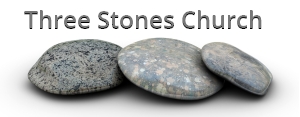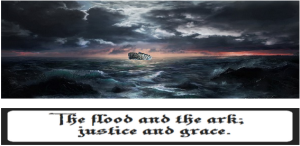This week we will be looking at the story of the flood, the destruction of what many believe to be millions of people – only eight surviving. It is a story of God’s justice by the flood and His grace by the ark.
Last week’s message from the first part of Genesis 4: Cain was cursed from the ground, received a mark of protection from God, then made what I believe was a conscious decision to go “away from the presence of the Lord.” He did not repent. Between that and this Sunday’s message, a lot has taken place:
The origin of society in Genesis chapter 4, verses 17 to 26
Genesis 4 & 5 are terribly important, because it is the only existing record of the antediluvian (pre-flood) society. Biblical scholars suspect the world was quite different, prior to the flood
- Probably little if any wind
- No rain, no snow.
- The terrain was probably less severe, more flat land surfaces.
- The climate was mild; the environment was friendly, not prone to natural disasters.
– In that environment, people lived for several centuries.
– Marriages were among family members, remember, this was prior to the genetic malfunctions that made this dangerous, eventually, after the flood, God prohibited this
– They were intelligent, skilled, productive, strong and healthy people; the pre-flood era was amazing.
– They were creative. Ch. 4, vv. 21-22 tell us of Jubal the father of all those who play the lyre and pipe and Tubal-cain, the forger of bronze and iron instruments
– There were many, many people at this time, but the story focuses on the families of Cain and Seth
– Ch. 4, verses 16 to 24, gives us the story of the evil, murderous line of Cain. We even hear one of Cain’s progeny, Lamech, boast about killing a young man. As unpleasant as that boasting was, it also contained all the elements of the highest form of language – poetry. These were not unintelligent, grunting Neanderthals; these were highly intelligent human beings.
– They were advanced in the arts and in science, but without God.
– In v. 25 and 26, we see Seth’s family, which will continue in chapter 5
Chapter 4 ends with “At that time people began to call upon the name of the Lord.”
That brings us to chapter 5, where:
- Introduced to the line of Seth and sacred culture.
- There is no indication that any in Cain’s line were righteous.
- Seth’s line righteous but for a short time; by the time of the flood, there were only eight righteous people living.
In the genealogy in chapter 5 and see some interesting things:
In this is the “Book of Adam” we take the first steps down the path to where the seed of the woman will crush the seed of the serpent.
We get a foretaste of salvation, as this line leads to Noah.
I wonder if you’ve ever noticed what the ages reveal?
- Adam lived 930 years, and most likely died just before the birth of Noah.
- Adam could have told Noah’s father about the Garden, the fall, the curses, and the promise that the seed of the woman would someday end the curse.
- Interesting when we hear that Noah’s father “called his name Noah, saying, “Out of the ground that the Lord has cursed, this one shall bring us relief from our work and from the painful toil of our hands.”
- More math: Adam lived 200 years into Methuselah’s life, who overlapped Noah for 600 years. So one man, Methuselah, spans the lives of both Adam and Noah.
- So when it’s questioned how accurately information could have been passed on from “generation to generation” it’s important to realize that Methuselah knew personally about Adam and could share what he knew with Noah.
This is not directly related to this week’s sermon, but it’s very interesting.
- Noah’s live overlapped Shem’s by 400 years.
- Abraham was born and died during Shem’s lifetime
- Shem could have told Abraham about the flood.
- Shem was still alive during the lifetimes of Abraham, Isaac, and Jacob.
- Four people’s lifetimes spanned from creation to Abraham.
- Adam, Methuselah, Shem, and Abraham bridge the time from creation to Jacob.
- So then, for Abraham, creation was an event that took place with his great grandfather.
- How does that affect your thinking about the accuracy of the truth being passed along?
Please read Genesis 6 and consider the following:
- Does the flood make you question God’s goodness?
- Was the flood justice? Grace? Both?
- How would you compare the flood and the Garden exile?
- Noah was a righteous man – is that what saved him?
6 When man began to multiply on the face of the land and daughters were born to them, 2 the sons of God saw that the daughters of man were attractive. And they took as their wives any they chose. 3 Then the LORD said, “My Spirit shall not abide in man forever, for he is flesh: his days shall be 120 years.” 4 The Nephilim were on the earth in those days, and also afterward, when the sons of God came in to the daughters of man and they bore children to them. These were the mighty men who were of old, the men of renown.
5 The LORD saw that the wickedness of man was great in the earth, and that every intention of the thoughts of his heart was only evil continually. 6 And the LORD regretted that he had made man on the earth, and it grieved him to his heart. 7 So the LORD said, “I will blot out man whom I have created from the face of the land, man and animals and creeping things and birds of the heavens, for I am sorry that I have made them.” 8 But Noah found favor in the eyes of the LORD.
9 These are the generations of Noah. Noah was a righteous man, blameless in his generation. Noah walked with God. 10 And Noah had three sons, Shem, Ham, and Japheth.
11 Now the earth was corrupt in God’s sight, and the earth was filled with violence. 12 And God saw the earth, and behold, it was corrupt, for all flesh had corrupted their way on the earth. 13 And God said to Noah, “I have determined to make an end of all flesh, for the earth is filled with violence through them. Behold, I will destroy them with the earth. 14 Make yourself an ark of gopher wood. Make rooms in the ark, and cover it inside and out with pitch. 15 This is how you are to make it: the length of the ark 300 cubits, its breadth 50 cubits, and its height 30 cubits. 16 Make a roof for the ark, and finish it to a cubit above, and set the door of the ark in its side. Make it with lower, second, and third decks. 17 For behold, I will bring a flood of waters upon the earth to destroy all flesh in which is the breath of life under heaven. Everything that is on the earth shall die. 18 But I will establish my covenant with you, and you shall come into the ark, you, your sons, your wife, and your sons’ wives with you. 19 And of every living thing of all flesh, you shall bring two of every sort into the ark to keep them alive with you. They shall be male and female. 20 Of the birds according to their kinds, and of the animals according to their kinds, of every creeping thing of the ground, according to its kind, two of every sort shall come in to you to keep them alive. 21 Also take with you every sort of food that is eaten, and store it up. It shall serve as food for you and for them.” 22 Noah did this; he did all that God commanded him.
— Genesis 6




0 Comments